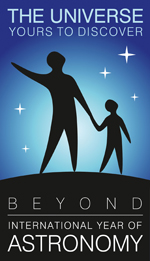‘Be an INTEGRAL astronomer’ – competition winners announced
8 October 2009
Students from India and South Africa have been selected as the winners of the European Space Agency's ‘Be an INTEGRAL astronomer' competition.
To celebrate the International Year of Astronomy 2009, ESA organised a competition in which students were presented with data from the European INTEGRAL space observatory and asked to study the Galactic Bulge, one of the most active regions at the heart of our Galaxy. Entrants were required to perform research tasks using INTEGRAL data of variable X-ray sources. The tasks included interpreting the data, searching for evidence of variability and then writing a report on their research.
In the secondary school students' category, the winner was Shyamal Patel of Baroda High School, Vadodara, India. 18 year-old Shyamal is a keen amateur astronomer who has participated in several activities to promote and increase awareness of astronomy, including a workshop for school students during the total solar eclipse of 22 July 2009. He was previously the winner of a student competition to attend the 2007 International Astronautical Congress.
"My interest in the field of astronomy always keeps me excited to explore our Universe," said Shyamal. "(The) ‘Be an Integral Astronomer' competition gave me an opportunity and motivation to work, explore and understand the high energy Universe."
The runners-up in this category were:
- Cristina Cirstoiu, Colegiul Naþional "Vlaicu Vodã", Curtea de Arge, Romania.
- Lauriane Fillot, Lycee Louis-le-Grand, Paris, France.
- Stanislav Fort, Gymnázium Pierra de Coubertine, Tabor, Czech Republic.
- James Wills, Winchester College, UK
The winner in the category for university undergraduates was Michelle Knights, from Rhodes University, South Africa. Michelle has been an avid amateur astronomer since she was about six years old. She loved Physics at school and decided to study it at Rhodes University, where she is currently in her third year, majoring in Maths and Physics.
"I was very excited when I heard about the INTEGRAL Astronomer competition," she said. "The prizes sounded fantastic of course but I really wanted to try my hand at some ‘real' astronomy. I thoroughly enjoyed exploring ways of finding information about objects from natural data and I felt a bit like a detective trying to solve a puzzle."
The runners-up in this category were:
- PhyllisTzu-Ching Yen, National Tsing Hua University, Taiwan.
- Francisco Hernandez, Universidad de Valladolid, Spain.
- Vaidehi Paliya, Banaras Hindu University, India.
- Jacopo Diamanti, Sapienza - Università di Roma, Italy.
First prize for the two winners includes a trip to the European Space Astronomy Centre in Spain, plus an 'Astronomer's starter kit', comprising a Celestron SkyScout, a Media Player and the IYA2009 book ‘Eyes on the Skies'.
The INTEGRAL competition was run as part of the ‘International Year of Astronomy 2009 100 Hours of Astronomy' Cornerstone project, in which people around the world were given access to leading astronomical observatories.
ESA's INTEGRAL gamma ray observatory has been making groundbreaking observations of the most energetic objects in the Universe since its launch in October 2002.
More information: http://astronomy2009.esa.int
Search IYA2009 Updates

National Nodes: 148
Organisational Nodes: 40
Organisational Associates:33
National Websites: 111
Cornerstone Projects: 12
Special Task Groups: 11
Special Projects:16
Official Products:8
Media Partners:22


